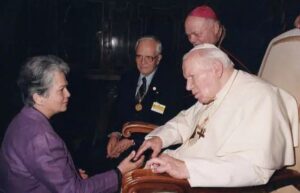The Sacred Meaning of One Human Life
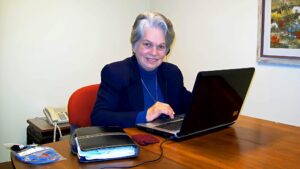
Dr. Sr. M. Elena Lugo
member of the Schoenstatt Sisters of Mary, returned home to the Heavenly Father at age 85, after four weeks of a painful but rapid deterioration of her body due to an already metastasized cancer. Fully conscious and clearly convinced that life is the goal of all care, she embraced the typical procedures any patient should receive in her situation. In this way, she taught her students one last lesson on bioethics. She made it possible for the medical doctors of the hospital to “serve human life in the particular uniqueness of the person”¹ Through a short but intense battle with cancer, she has delivered a most powerful lecture on the sacred value of human life.
A young doctor
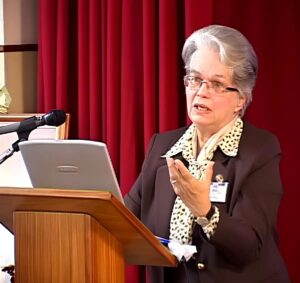
Elena Lugo was born in San Juan, Puerto Rico on June 28, 1938. She was the only child of her devoted parents, who recognized her intellectual gifts early on and encouraged her studies. In 1961, Elena obtained a bachelor’s degree in theology with a concentration in sociology and psychology. She pursued graduate studies at Georgetown University in Washington, D.C., USA, where she completed her doctorate degree in philosophy.
The surprising turnaround
For over 27 years, she worked as a professor of philosophy at the University of Puerto Rico at Mayagüez. It was here where Dr. Elena Lugo came to know Schoenstatt through her colleague, Sr. M. Paulette Baumgardt, who was teaching German at the university at that time. After spending some days with Sr. M. Paulette’s students in Austria and Germany in the summer of 1975, Elena extended her European travels to join a group of American pilgrims in Schoenstatt, six of whom were preparing to enter the community of the Schoenstatt Sisters of Mary that fall in Wisconsin. The pilgrimage experience was decisive for Dr. Elena Lugo. In a dramatic turn of events, she recognized and accepted her vocation while still in Schoenstatt, applied for admission to postulancy, and was admitted, despite the considerable age gap between her and her nine course sisters and despite the professional challenges she faced in keeping her faculty position while still participating in the required times of formation.
She began postulancy on September 1, 1975, in Madison, Wisconsin, at 37 years of age and received the dress of the Schoenstatt Sisters on March 13, 1976. Totally dedicated to her vocation as a child of the Blessed Mother, Sr. M. Elena soon returned to her position as a university professor in Puerto Rico. On June 27, 1984, she made her perpetual consecration as member of the community.
Inspiration from the Immaculate
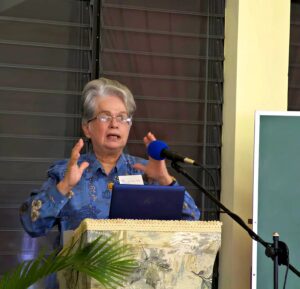
Her vocation as a Schoenstatt Sister of Mary flourished as she continued to integrate Father Kentenich’s view of the human person and community into her field. Above all, her deep, personal love for the Immaculata as God’s original concept of the human person shone forth in her person and her work. This was more than love for an idea, it was the transforming love for the Blessed Mother made evident in Sr. M. Elena’s noble, high-minded way of being, until the end of her life.
Pioneer of Bioethics
Over time, her work became a visible service to the Church. She pioneered several forums to teach the interplay between technology, politics, economics, social concerns, and personal care, teaching for example a person-centered ethics for engineers and a person-centered bioethics for pre-medical students. At her initiative, the newly founded Center of Philosophy in Its Interdisciplinary Function (CEPHIF) in Puerto Rico hosted a series of symposia on medical ethics and convened inter-American congresses, with participants from 24 nations in North, Central, and South America. The CEPHIF later became the Center for the Philosophy and History of Science and Technology and, finally, the Center for Ethics in the Professions. Dr. Elena Lugo was also one of the founding members of the Puerto Rican Federation of Bioethics and one of its past presidents.
John Paul II appointed her to the Academy for Life
In 2002, Dr. Lugo was appointed to the Pontifical Academy for Life inaugurated by Pope Saint John Paul II. She made regular trips to Rome especially in the following years to assist the Magisterium in its instruction of the faithful on the often difficult and controversial matters pertaining to human life, sexuality, and procreation.
Since her retirement from the faculty at the University of Puerto Rico at Mayagüez in 2003, she began to collaborate as a consultant in bioethics and as the founding president of the Father Joseph Kentenich Bioethics Commission for Argentina and Puerto Rico.
Inspired by Father Joseph Kentenich
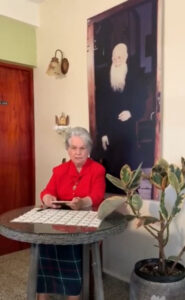
In manifold ways, she contributed to the development of the movement in Puerto Rico and the United States, and established the Father Joseph Kentenich Pedagogical Institute which received recognition by the Puerto Rican Bishops Conference. In recent years, she contributed to the research for the Causa Kentenich with loyal dedication. It was Sr. M. Elena’s sincere joy to help others grasp our founder’s way of thinking on issues affecting modern society. One such issue, for example, can be seen in her own words and teaching: “a wholesome healthcare that takes in the uniqueness of the patient, a type of covenant relationship that generates empathy and trust.”²
We thank the Heavenly Father for the life of Dr. Sr. M. Elena and for her total dedication to her mission and vocation as a Schoenstatt Sister of Mary and teacher of the value of the human person and life.
[1] Cf. Dr. Elena Lugo, Bioética clínica personalista: el aporte del padre José Kentenich, 2011. they treat a message she conveyed numerous times throughout her life.
[2] Cf. Ibid. Through her attitude, at the end of her life and in a vulnerable condition, she gave the medical faculty -her own students- a chance to bring bioethics theory down to practical life.
